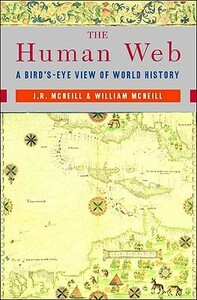You need to sign in or sign up before continuing.
Take a photo of a barcode or cover
19 reviews for:
The Human Web: A Bird's-Eye View of World History
John Robert McNeill, William H. McNeill
19 reviews for:
The Human Web: A Bird's-Eye View of World History
John Robert McNeill, William H. McNeill
McNeill & McNeill attempt a daunting task of summarizing the history of humankind from the shift from hunter/gatherer cultures to agrarian civilizations; all the way up through the modern era and the fall of the Soviet Union. I suppose how well they succeeded depends on the target audience and your role as a reader.
I, as a history major, found it somewhat useful for a basic overview of world history and some of the trends that made their way around the globe. However, I also found it entirely too loosely structured and too cursory at some points (like African history, which is mostly only referred to in relation to early Egyptian civilization or the African slave trade in the early modern period and other expressions of European colonialism). The authors have attempted a chronological approach, which logically makes sense, but the problem with this is that they jump around all the time from topic to topic, culture to culture, only to return to the first topic, as they're trying to include everything all over the world at the same time. This makes for sometimes jumbled and unstructured reading, which is not helpful for a history major trying to get a clear, concise overview of world history. What the chronological structure did help with, though was making clearer some of the global trends throughout history, which I found I had an easier grasp of after reading the book. However, the McNeills' economist backgrounds are so very clearly at display throughout the entire book - there is very little focus on social and cultural interaction and exchange between cultures, and extreme focus on the effects of trade and economics. The latter are of course important drives for much of world history, but the exclusion of the former is a problem in my eyes.
I suppose in the end that I must say, that it was an alright read. It's not as completely dry as a number of other textbooks, and it was useful for gaining an insight into different global trends.
I, as a history major, found it somewhat useful for a basic overview of world history and some of the trends that made their way around the globe. However, I also found it entirely too loosely structured and too cursory at some points (like African history, which is mostly only referred to in relation to early Egyptian civilization or the African slave trade in the early modern period and other expressions of European colonialism). The authors have attempted a chronological approach, which logically makes sense, but the problem with this is that they jump around all the time from topic to topic, culture to culture, only to return to the first topic, as they're trying to include everything all over the world at the same time. This makes for sometimes jumbled and unstructured reading, which is not helpful for a history major trying to get a clear, concise overview of world history. What the chronological structure did help with, though was making clearer some of the global trends throughout history, which I found I had an easier grasp of after reading the book. However, the McNeills' economist backgrounds are so very clearly at display throughout the entire book - there is very little focus on social and cultural interaction and exchange between cultures, and extreme focus on the effects of trade and economics. The latter are of course important drives for much of world history, but the exclusion of the former is a problem in my eyes.
I suppose in the end that I must say, that it was an alright read. It's not as completely dry as a number of other textbooks, and it was useful for gaining an insight into different global trends.
Koko maailman historia reilussa 500 sivussa isä ja poika -parivaljakolta. Kirja myös todellakin kertoo koko maailmasta, Euroopan sivumääräinen osuus on ehkä harvinaisenkin pieni.
What a pleasant overview of human history in reasonably small number of pages – just 480 pages of loosely set text to cover everything from ancient times to the fall of the Soviet Union.
The McNeills seem to do a good job here, when they focus on how the emerging networks shape the human history. It's a broad view, but I think it gives a good overall understanding of why the world turned out the way it did.
The McNeills seem to do a good job here, when they focus on how the emerging networks shape the human history. It's a broad view, but I think it gives a good overall understanding of why the world turned out the way it did.
slow-paced
Nothing in here was particularly new or Earth shattering based on my own interest in this topic. However, if you want an introduction to the ideas of Big History this book might fit your purposes.
challenging
informative
reflective
slow-paced
Definitely an interesting look at the development of human society, giving due coverage to development in non-Western areas for the world and positing reasons of why some societies were able to develop faster or more effectively than others. I do wish the book was more self-critical, however; rarely did the authors concede that there was disagreement about how events happened or how these events should be explained, and the book contains few citations. It'd also be nice if the prose was a little livelier - the authors, especially toward the beginning, tend to stack facts on top of each other, and going on about who was growing sorghum and who was growing alfalfa without context of what these different agricultural trends meant doesn't make for fascinating reading.
Well, technically I didn't finish the whole thing, but I did my last reading for my Global History course today, so I'd say it counts.
This book was a really good overview of the history of humanity, told with an emphasis on globalisation which I liked. There is a lot of information to take in though, and at times it can seem overwhelming. However, if you have an history event you want to get a good overview for, and maybe view it from a different global perspective, this book is likely to have what you're looking for.
This book was a really good overview of the history of humanity, told with an emphasis on globalisation which I liked. There is a lot of information to take in though, and at times it can seem overwhelming. However, if you have an history event you want to get a good overview for, and maybe view it from a different global perspective, this book is likely to have what you're looking for.
The history of the entire human race in just over 300 pages. Dense and often slow but pretty interesting. I learned a lot about longstanding ecological connections between humanity and the planet: the domestication of wheat, goats, etc etc. It was good at drawing complex connections: alfalfa bacteria meant certain crops could be cultivated which could support certain types of horses which meant raiders could sweep into China from the steppes. Impressively done, alfalfa bacteria!
..... I know I had more to say but I finished this in September so WHO KNOWS what it was.
..... I know I had more to say but I finished this in September so WHO KNOWS what it was.





